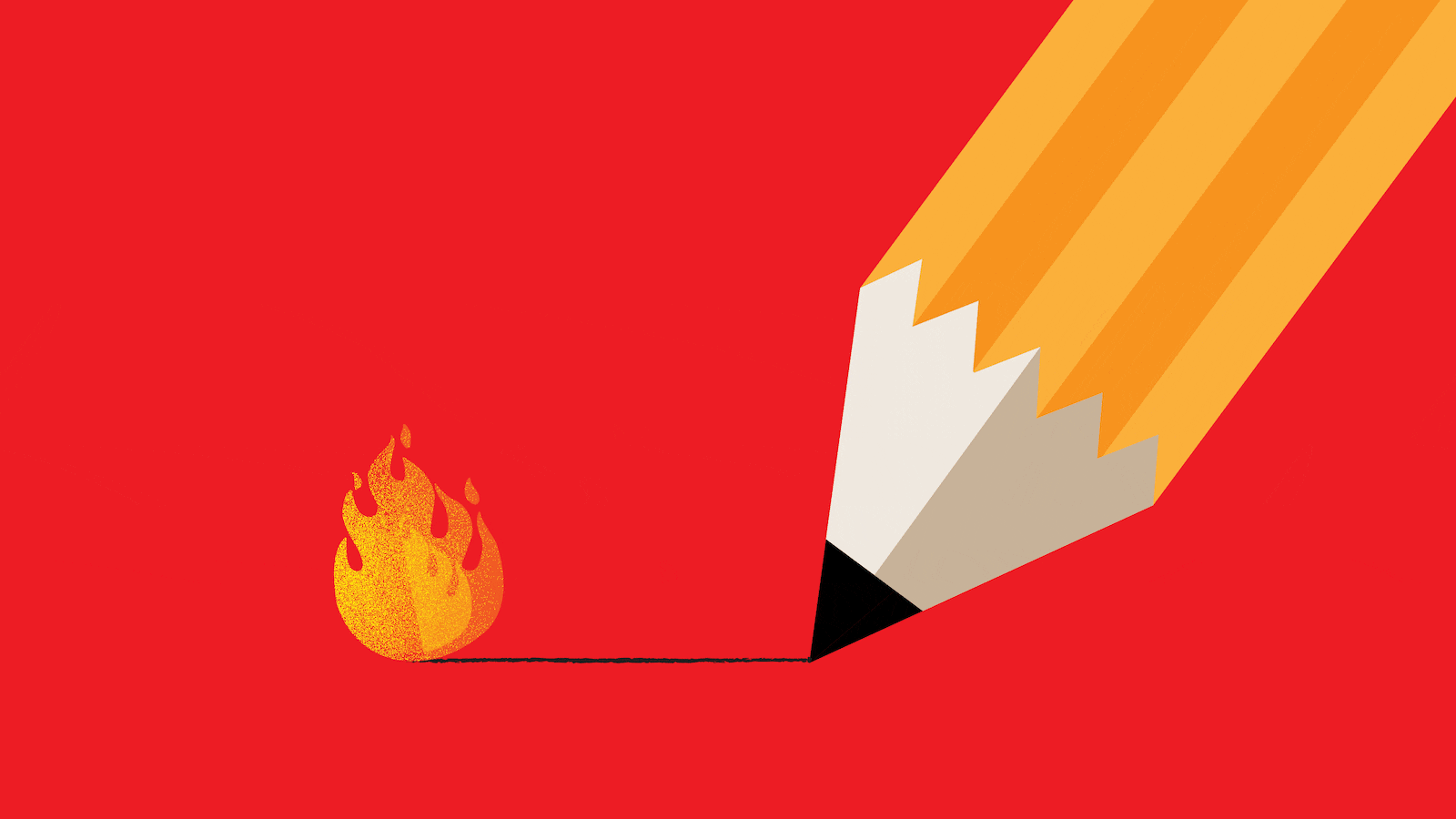This week, Writers Guild of America members are deciding whether or not to authorize a strike. Online voting began on April 11 and will continue for a week, and British and Canadian writers guilds have already urged their members not to cross the picket lines should a strike move forward. In the meantime, some members have begun sharing bleak personal anecdotes that speak to the state of the industry and explain their decisions to vote “yes.”
Hollywood writers last authorized a walkout in 2007; the strike lasted for 100 days, and the WGA ultimately prevailed. The industry has changed since then, largely thanks to streaming and a series of mergers that have obliterated competition for writers’ work. More writers work for their union’s minimum annual salary than did a decade ago, so as Abbott Elementary writer Brittani Nichols puts it, “[O]ur minimum wage has become our ceiling.”
The stories circulating on social media range from frustrating to alarming. Michael Mohan, who co-created the Netflix series Everything Sucks! alongside Ben York Jones, revealed on Twitter Wednesday that they both “used to steal food from the Netflix cafeteria to feed our families.”
As Mohan explained, he and York Jones “had to write for many months for free and couldn't take other jobs” while making Everything Sucks! Unsurprisingly, he believes that the WGA’s demands are “1000% reasonable.”
Not everyone seems to sympathize with these workers’ pleas. Look at any writer’s post on Twitter, or any writing about the strike, and you’re likely to find naysayers who question their talent or the prestige of their output. But take it from one two-time Emmy winner: It’s not that simple.
Ashley Nicole Black and fellow writers on the TBS late-night series Full Frontal with Samantha Bee have been nominated for seven Emmys and won two of them. On Wednesday, she rebuffed the idea that writers struggling to make ends meet simply aren’t working on “hit shows.”
“Lol, funny story, writing on hits doesn’t make you any more money!” Black wrote. “That’s a big part of the problem!”
Before streaming, Black pointed out, you could write a hit series and earn money not just on its first airing, but also on the back end when the studio inevitably sold the series to other networks to re-air in syndication. (It’s how Friends wound up on Nick at Nite, and how some of us who did not grow up with HBO were able to catch episodes of Sex and the City on TBS some afternoons.)
“But now if you write on a hit for a network they don’t sell it to another network, they sell it to their own streamer,” Black wrote Wednesday. “Or if you wrote it for a streamer they sell it nowhere. So even if it’s a huge hit, they get to determine the value and then they send you a check for $1.25.”
“So residuals kind of don’t exist anymore,” Black concluded. “When you add that to wages going down at all levels, smaller writers rooms, and shorter working periods, writers are being squeezed in all directions and folks don’t have enough savings to live between seasons of (even hit) shows.”
All of that, Black added, also puts aside the fact that writers should be able to make a living wage regardless of how popular their shows become.
Multi-Emmy-winning writer and producer Matt Hubbard, who has written for series including 30 Rock, Parks and Recreation, and Superstore, wrote on Twitter (via an unverified account) that he “enthusiastically” voted to authorize a strike “because I wrote on one of the worst sitcoms of all time 20 years ago and STILL get residuals from it.”
Hubbard did not specify the show, but is credited as a writer on six episodes of the Friends spin-off Joey. “This new generation of writers deserves the same level of compensation I received for completely fucking up,” he added.
He’s got a point. After all, how can we expect our TV and film writers to produce interesting, genuinely boundary-pushing work if they’ve also got no financial room for a misfire?
Alex Blagg, who co-created and executive-produced the Emmy-winning late-night show @midnight and also won a daytime Emmy while writing for the Netflix series Trinkets, echoed others’ sentiments.
“I’m voting YES on the WGA strike authorization because even though I’ve co-created shows, won Emmys, been on The Black List, sold two features and staffed steadily in TV for 8 straight years, I still can’t figure out how to earn a stable living as a writer,” Blagg wrote Tuesday, adding that it’s “time to pay us what we’re worth.”
Most of the stories circulating online do boil down to that theme: writers are tired of watching their wages shrink and being forced to fight studios that allegedly try to shortchange them. Writer Alanna Bennett, who has worked on series including the CW’s Roswell, New Mexico reboot and the upcoming To All the Boys I’ve Loved Before spin-off series XO, Kitty, wrote on Twitter Tuesday that “the current system is unsustainable.”
“Over the past 3 years I’ve been in 3 writers rooms, optioned 2 pilots, sold a studio feature on a pitch & wrote & rewrote & polished it, and more,” Bennett wrote. “None of that stopped me from having to go on EBT for a while.”
Now, Bennett added, “I’m working on adapting a hit book to a feature, with a star attached. I have an action movie pitch attached to a production company. I’m shopping around a series. And I’m still broke.”
“Every writer I know is fucking terrified of a strike,” Bennett added. “Why? Because we are ALL ALREADY BROKE. But that’s not on us. That’s on the system we’re fighting against. A system that spends $30mil on exec bonuses and will buy showrunners Teslas but won’t pay people enough to live on.”
The pay disparities in Hollywood between creatives and executives have proven to be another key theme among writers’ concerns. (And remember: If writers aren’t making a living wage, what does that mean for all of the writer’s assistants and support staffers being paid even less, whose career ladders have been all but destroyed by structural changes in the industry?)
In one particularly telling tweet, The Other Two writer Gilli Nissim wrote (from an unverified account) that she’d voted to authorize a potential strike “for many reasons but mainly because my sister makes a salary of over $300k with benefits at a streamer for SCHEDULING the shows my colleagues CREATE.”
Last Week Tonight writer Johnathan Appel made the same point a bit differently in his own tweet on Wednesday. As he put it, “writing is the backbone of the whole industry. We deserve stable incomes and careers. Also the CEO of Warner Discovery got 39.3 million for the idea of ‘rename streaming service’ and ‘remake Harry Potter & LOTR.’”








